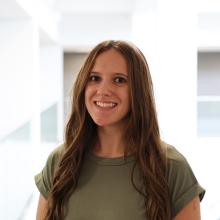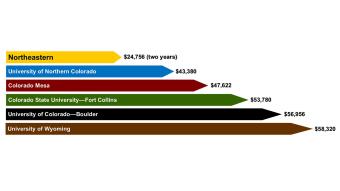Staff




Transfer programs are designed for students to take general education courses (math, science, English, humanities, etc.) plus courses in the area of their major totaling approximately 60 credit hours. Students work toward an Associates of Arts (AA), Associates of Science (AS) or an Associates of General Studies (AGS) degree, then transfer that degree or those courses to a four-year college or university to complete the remainder of their Bachelor's degree.
Career/Technical programs are designed for students to take courses specific to their interests and work toward an Associates of Applied Science degree (AAS, applies directly to the field). This degree is very specific and the program in its entirety doesn't transfer, although some courses within the program transfer easily.
Courses in our transfer programs transfer easily to most colleges and universities. A close relationship with your advisor and research of the college you wish to transfer is highly encouraged for ease of transferring. However, if you're enrolled in a career/technical program, not all of your credits are intended to transfer.
We're an open enrollment college. This means Northeastern doesn't require a specific GPA or ACT/SAT scores to be admitted. We do require accurate paperwork, documentation and proof of residency to complete your admission file. We're more concerned with what you choose to do after you arrive on our campus than what you did before.
You don't have to take the ACT to attend Northeastern. Students are allowed self-placement to determine their course level. However, you may opt to take an assessment test (Accuplacer, Compass or Asset) prior to enrolling in classes as part of our placement for success program. The cost of the test is $15 and a photo ID is required. Please contact the Student Success office to schedule testing.
Yes. If you've taken courses at an accredited college, there is a good chance you can transfer that credit to Northeastern. Contact the Office of Records for specific information.
Once you've applied for admission, you should receive information for pre-registration dates. You're invited to campus to meet with a temporary advisor and set up you first course schedule.
There are many reasons students choose to attend a two-year college first, then transfer to another college or university.

Northeastern has over 30 clubs and organizations. From Collegiate Farm Bureau to Video Game Club, we have something for everyone. Visit our clubs and organization page for more information.
For students who qualify for work study positions (through FAFSA), there are numerous on campus employment opportunities. Sterling also has a number of establishments for college students who seek employment. For more information on work study positions, click the button below.
Because of the success rate of freshman who live on a residential campus, all freshman (taking less than 30 college credit hours) under the age of 23 are required to live on campus. However, if the student's parents or legal guardian live within a 60 mile radius and the student plans to reside with them, the student is exempt. For students with exceptional circumstances, contact the Office of Residence Life at 970-521-6608.
Every new student meets with an assigned advisor who will help them choose the best classes for their program of study. To make an initial advising appointment, contact the Office of Student Success.
No. Many students, regardless of age, have no idea what they want to study. Northeastern provides you all the tools to explore career goals and to be successful academically.
There is not "one type" of student on Northeastern's campus. We have students from all over Colorado, the United States and from many foreign countries. Our total enrollment is about 4,100 learners (part-time and full-time) with approximately 1,000 of those learners being of traditional age and attending full time.
Yes. However, since our career/technical programs are designed to send our graduates into the work force, you'll have additional general education requirements to fulfill and some of your specific courses won't transfer. Once you decide you want to transfer, it's important to let your advisor know as soon as possible so he/she can change you to a transfer degree program.



